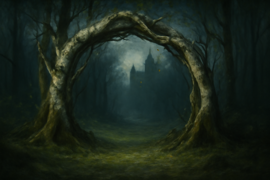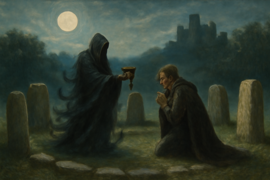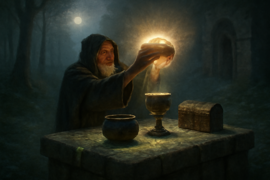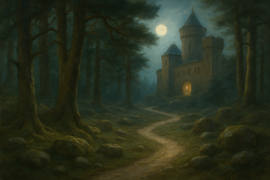Introduction
Beneath a pale, silvered moon that washed the world in soft light, an ancient forest unfurled like a tapestry of secrets. Towering pines rose in columns, their bark gnarled and dark, veined with lines of age and wisdom. A damp hush lingered in the air as the distant call of an owl echoed through the branches. Among the roots and moss, a master walked with steady purpose. His cloak, woven from the finest wool, swayed silently behind him, and in his eyes glimmered both resolve and caution. He had heard the whispers of the wood’s curse: that those who entered at dusk might be granted marvels beyond mortal ken—riches, knowledge, and power—but only at the cost of their own virtue. The master pressed on, guided by a flicker of hope that had survived centuries of temptation and ruin. Every step crackled underfoot as he left the worn road and ventured deeper into the wild heart. Here, legends said, the boundary between the world of men and the realm of shadow grew thin, and a test awaited anyone bold enough to face it. Some claimed a voice would soothe the soul with promises of grandeur, while others spoke of illusions so sweet that they ensnared the mind forever. Yet every account ended the same: only those whose hearts shone with genuine goodness could resist the deceptive embrace of darkness. With each inhale of scented pine and damp earth, the master felt his spirit steady. He carried the faith of his village, the memory of his ancestors, and a steadfast belief that true nature, however battered, could not be broken. As he paused beneath an arch of intertwined branches—an unspoken threshold between realms—he drew a deep breath and stepped forward. The hush of the forest welcomed him, a silent herald that his journey toward virtue’s crucible had begun.
The Master’s Arrival
The forest opened before the master like an ancient gateway. Moss-clad oaks arched over the narrow trail, their limbs entwined as if whispering secrets to one another. He paused to feel the tremor of life beneath his boots—the quiet stir of small creatures, the trickle of water in hidden streams. Each breath was a tonic, mixing the scent of pine needles with the faint perfume of wildflowers. As he pressed onward, the hush deepened and shadows thickened. Flames of candlelight flickered far ahead, suspended in air without a source, and he wondered if his eyes betrayed him. Yet the light held no warmth; it was ethereal, beckoning him like a promise too grand to resist. He felt the weight of expectation settle in his chest. Legends spoke of a clearing where the test would unfold: a ring of stones bathed in moonlight. Many before him had faltered there, entranced by visions of treasure or lost loved ones. Some were drawn astray by promises of power, only to vanish like mist at dawn. But the master’s heart was steadfast. He recalled the tales his grandmother told, of kindness that outshone greed, and of simple acts of mercy that altered destinies. When he came upon the circle of stones, he found it empty—save for the shifting glow of spectral lanterns. He stepped into the ring, and the air vibrated with latent energy. A voice, soft as wind through reeds, murmured his name and offered a chalice of gold, filled with wine that sparkled like starlight. The chalice promised wisdom beyond mortal reach, urging him to sip and claim his birthright. The master felt a flutter of desire stir within him, a longing for knowledge unbounded. Yet he remembered the terms of the test: every gift came at a price. With a calm breath, he let the chalice slip through his fingers onto the earth. The wine spilled in luminous droplets that faded into the grass. The lanterns dimmed, and silence reclaimed the clearing. His pulse steadied, and he bowed his head in quiet triumph—not for the gift refused, but for the goodness that endured.

Temptation in the Shadow
No sooner had he declined the golden chalice than the air grew colder. Inky shadows slithered between the stones, lengthening into shapes both human and beast. A melody, faint and beguiling, drifted on the wind—silken notes that tugged at the heart’s most secret longings. From the gloom emerged a figure draped in midnight robes, face hidden behind a mask of polished obsidian. The visitor’s voice was velvet, each word caressing the ear with promised delights: power to bend the will of men, riches to adorn his halls, and a legacy that would echo through history. The master’s resolve wavered for the briefest heartbeat. He envisioned his village flourishing under his guidance, his name inscribed in the annals of time. But the phantom’s eyes held no compassion—only infinite hunger. He saw the ruin behind the allure: children left hungry, innocence traded for empty glory. From a distant corner, a gentle light emerged—a solitary lantern swinging on a branch, casting a warm glow. It revealed a small bird, feathers glistening like dawn’s first rays. The bird sang a simple tune: a melody of hope and forgiveness. In that humble song, the master recognized the truth his heart had always known: true greatness lay not in conquest, but in compassion; not in dominion, but in service. He turned from the masked figure and strode toward the bird, each step guided by the steady beat of his own conviction. The melody swelled, suffusing the clearing with warmth. The phantom recoiled, its form unraveling into shadowy mist that drifted away, vanishing among the trees. The lantern’s glow expanded, and the bird took flight, its wings scattering embers of light. The master knelt in reverence, offering silent gratitude for the gift of clarity. In that moment, he understood that the deepest temptation was the lure of false promises, and that resistance revealed the strength of his spirit. With his virtue affirmed, he rose to face the final trial.

The Final Trial and Triumph
As the last notes of the bird’s song faded, the forest shifted around him. Trees bent inward, forming a vaulted canopy that glowed with bioluminescent moss. The ground pulsed like living amber, and from its depths rose a dais of ancient stone. Upon it lay three treasures: a sword gleaming with silver light, an orb swirling with violet mist, and a simple loaf of bread still warm from an unseen oven. The master knew instinctively that one held the power to vanquish darkness, another the knowledge to reshape the world, and the third the sustenance to heal a starving land. He approached the sword first—its edge promised swift justice, but in its reflection he saw his own uncertain gaze. The orb whispered formulas of arcane might, yet each secret it offered seemed to demand another’s pain. Finally, he lifted the loaf. Its crust was firm but tender, and the aroma of wheat and honey stirred memories of his childhood hearth. As he broke the bread, the scent of home filled his senses, and he realized that nourishing others was the truest form of strength. He set the sword and orb aside and embraced the humble gift. In that act, the forest trembled and the canopy burst into radiant petals that rained down in iridescent showers. The moss glowed brighter, and the stones hummed with blessing. A gentle wind carried the master’s offering through the woods, revitalizing each corner it touched. Streams cleared of silt, trees straightened their gnarled limbs, and the songs of birds returned in joyful chorus. The master knelt upon the dais, tears of gratitude shining like dew in the lantern-light. A voice—neither phantom nor bird—spoke within him: “You have chosen the path of compassion, and in doing so, you have broken the forest’s curse.” As dawn’s soft fingers brushed the horizon, the enchanted glow faded, and the forest stood renewed. The master walked home beneath a canopy alive with birdsong, carrying the memory of a trial that tested the very core of his soul. In refusing ease and embracing selfless care, he had proven that while evil may allure, good endures beyond every shadow.

Conclusion
The clearing remained silent once more, save for the distant murmur of leaves stirred by dawn’s first breeze. In that peaceful stillness, the master felt an unspoken bond linking him to every soul that walked under the forest’s boughs. He had faced whispered promises of power and witnessed their hollowness. He had glimpsed visions of grandeur and learned they paled next to kindness. Above all, he had chosen the simplest offering—a loaf of bread—to heal and nourish, and in that choice, he discovered the resilience of goodness. Word of his trial traveled far beyond the forest’s edge, carried by merchants, pilgrims, and birds on their morning flight. Villages flourished, for the master taught that true treasure lay not in gold or arcane secrets, but in acts of compassion exchanged between neighbors. Century after century, the legend lived on, a reminder that even when evil allures with transient splendor, the enduring strength of kindness outshines every tempting shadow. In every shadowed grove and moonlit clearing, hearts remembered the master who chose bread over blade, mercy over might, and in that choice, etched the timeless truth: good, however tested, will always endure where darkness fades away forever.
In retelling this tale, generations found courage to resist hollow temptations and to uphold the light of virtue. The forest became a symbol, the stones a testament, and the loaf a beacon—the simple symbols of a truth that knows no age: that in the deepest trials, the heart’s goodness will outlast every shadow, every seduction, every whisper of despair. Evil may allure, but good endures across all time, in every kind heart that refuses to betray its own best self, and in every soul brave enough to walk the path of compassion wherever it may lead them beyond the darkest night into the dawn of a kinder day.
And so the tale goes on, carried in song and story, a living promise that virtue, like a single candle flame, can dispel the deepest gloom and kindle hope in every generation that dares to choose love over lure, service over self, and goodness over all else until the end of days.

















